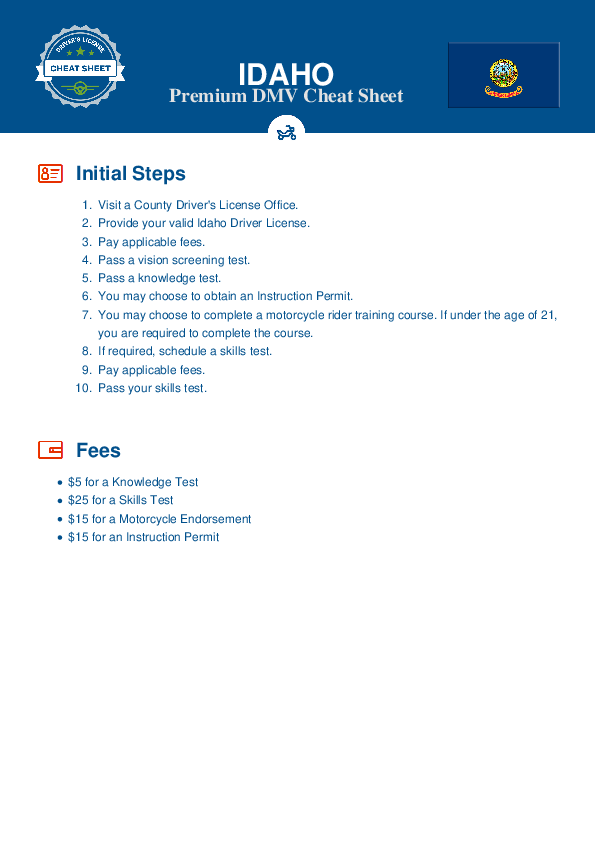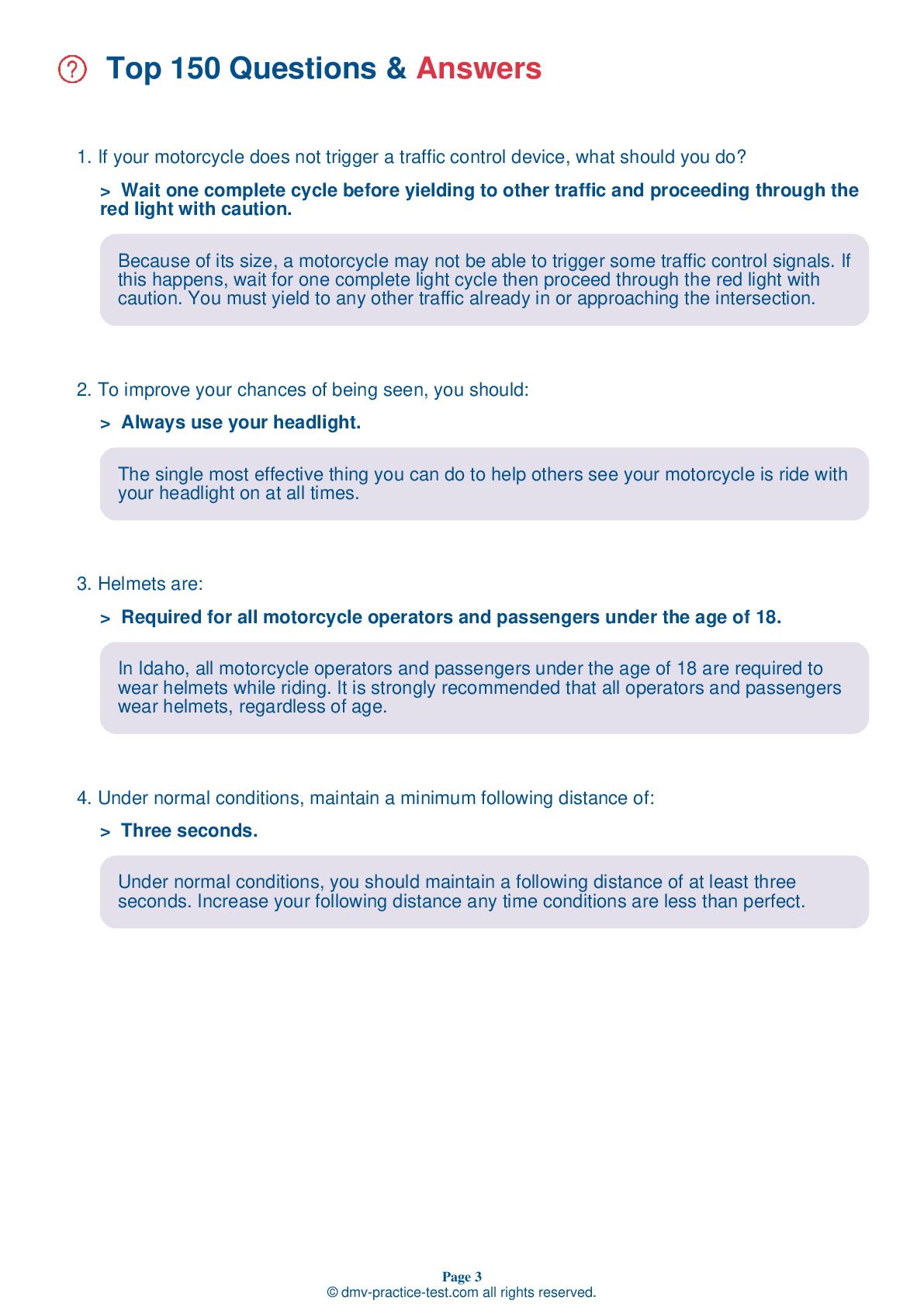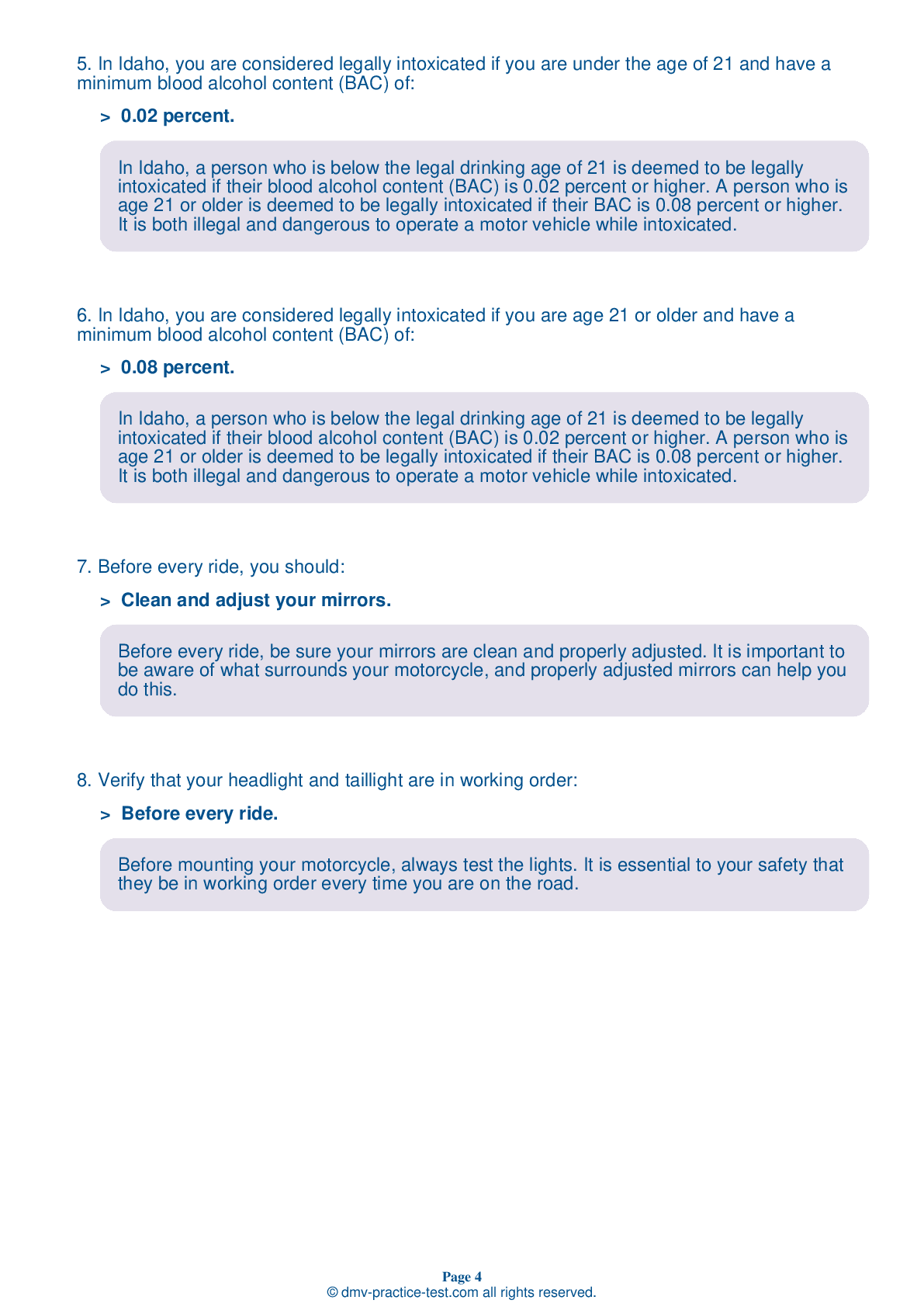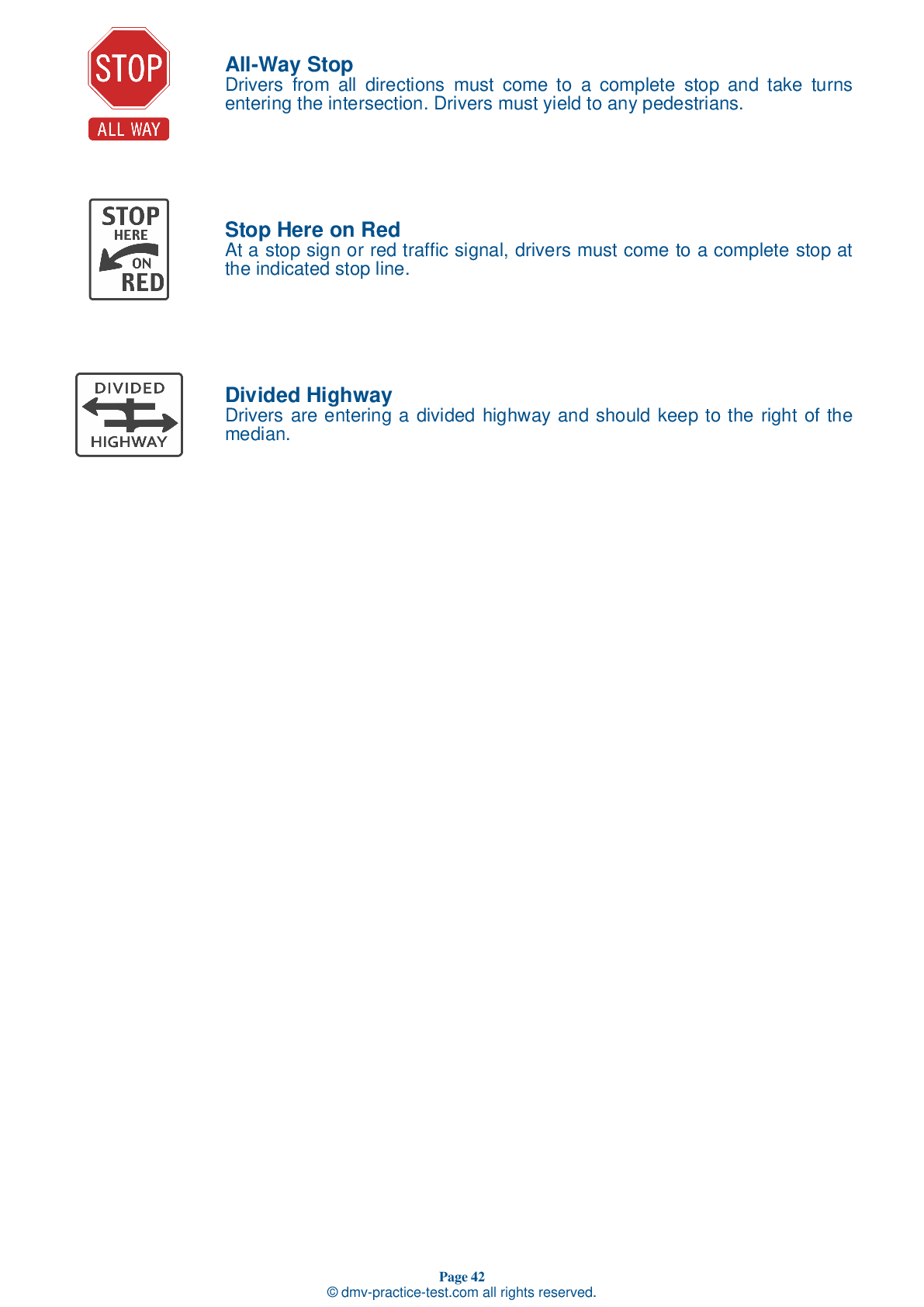DMV Permit Test #14
Motorcycle Test | License ID 2026 | FREE Online Practice! #14
Take this FREE motorcycle test (license in ID 2026) to check your knowledge of the road rules. To improve your results, download a motorcycle handbook online, study theory, and practice for free on our website. Still worried about how to get a motorcycle license in Idaho in 2026? Check our website for more sample tests, train as much as possible, and boost your grades!
25
20
16
1 . If a tire goes flat while you are riding and you must stop, you should:
Relax on the handgrips.
If either of your tires go flat while you are riding, hold the handgrips firmly, ease off the throttle, and maintain a straight course. If you need to brake, gradually apply the brake to the tire that is not flat. As you slow down, edge to the side of the road, squeeze the clutch, and stop.
2 . A motorcyclist should not rely only on their mirrors because:
To remain aware of your surroundings, it is not enough to rely only on your mirrors. Motorcycles have blind spots just like any other vehicle.
3 . Which of the following is not a safe step in preventing fatigue while riding?
Taking frequent breaks
When taking a long trip, be sure to schedule in frequent breaks to rest and try not to ride more than six hours in one day. Wind, cold, and rain can make you tire quickly, so be sure to dress to protect yourself from the elements. Avoid taking artificial stimulants, as the effects when they wear off can be very dangerous.
4 . If you see this sign above your lane, you:
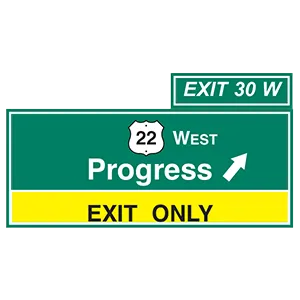
Must exit the freeway, if you stay in your current lane.
If a yellow panel with the message "Exit only" is on a highway sign, the lane below the sign will not continue through the interchange. Instead, the lane will go off of the roadway to form a ramp. If you are in a lane directly under an "Exit only" sign, you may change lanes to move through the interchange or you must exit the highway.
5 . Scan the road ______ ahead of your motorcycle.
Three seconds
Search your path of travel at least 20 seconds ahead of your motorcycle. This will allow you to see and react to hazards before meeting them.
6 . Which of the following surfaces is unlikely to provide poor traction for motorcyclists?
An ice patch
A number of surfaces can provide poor traction for tires. Wet pavement; roads covered in loose gravel or sand; muddy, snowy, or icy areas; painted lane markings; and metal covers and plates in the road can be more hazardous for a motorcyclist than dry pavement.
Need Motorcycle Insurance? No problem!
Compare the best rates in Idaho and find a personalized policy that meets your needs.
1. Are You Currently insured ?
2. Married ?
3. Do you own your Home?
4. Have you or a Family Member Honorably Served in U.S. Military ?
5. Your Name
6. Age
7. Zip code
Ranked by best match
2026 Idaho | Frequently Asked Questions
To acquire a motorcycle driver's license in Idaho, you must pass a written test and a skills test. If you're under 21, you must also complete a state-approved motorcycle rider training course. After passing these tests, you can apply for a motorcycle endorsement to add to your existing Idaho driver's license at your local DMV office.
In Idaho, the minimum age to obtain a motorcycle endorsement is 15 years old. However, those under 21 years old must first have a supervised instruction permit for at least six months. They must also complete a motorcycle rider training course approved by the Idaho STAR program.
Yes, in Idaho, you must have a motorcycle endorsement added to your driver's license to legally operate a motorcycle. To get this, you need to pass both a written test and a skills test. However, if you've completed an approved Idaho STAR motorcycle rider training course, these tests may be waived.
In Idaho, you need to provide proof of your age, identity, and residency. This can be done with a valid ID, birth certificate, and utility bills or lease agreements. You also need a valid driver's license. If you're under 18, parental consent is required. Lastly, you need to pass a vision test, written exam and skills test to get your motorcycle license.
Yes, to obtain a motorcycle license in Idaho, you must take a written exam. The test covers topics like road signs, motorcycle laws, and safe riding practices. However, if you complete an approved Idaho STAR motorcycle rider training course, the written and skills tests may be waived at the DMV's discretion.
The motorcycle written test in Idaho covers a variety of topics related to motorcycle safety and operation. These include understanding road signs and signals, motorcycle laws, emergency procedures, and safe riding practices. It also tests your knowledge of the effects of alcohol and drugs on riding abilities. The test is based on the information found in the Idaho Motorcycle Operator's Manual.
In Idaho, completing a Motorcycle Safety Foundation (MSF) approved course can waive the skills test but not the written test. The written test is mandatory for all applicants. However, taking a training course can better prepare you for the written test by providing necessary knowledge about motorcycle safety and Idaho's traffic laws.
To enroll in a motorcycle training course in Idaho, you first need to find a state-approved course provider. You can do this by visiting the Idaho STAR (Skills Training Advantage for Riders) Program website. Once you've chosen a course, you can register online or by phone. The course fee varies depending on the level of the course you choose.
No, you don't have to own a motorcycle to take the license test in Idaho. You can use a friend's motorcycle as long as it's registered, insured, and passes the pre-test inspection. However, you must have written permission from the owner if the motorcycle isn't registered in your name.
Yes, you can use a friend's motorcycle for the driver's license test in Idaho, provided it is properly insured, registered, and meets all safety requirements. Ensure you're comfortable riding it and it's suitable for your height and weight. Remember, you must have written permission from the owner if the motorcycle isn't registered in your name.
Yes, the Idaho motorcycle driving exam tests specific handling skills. These include starting and stopping, turning and swerving, and maintaining proper speed and distance. The test also assesses your ability to navigate through traffic safely, your understanding of Idaho traffic laws, your preparedness for emergency situations, and your knowledge of the motorcycle controls.
In Idaho, new motorcycle drivers under the age of 21 are required to complete a STAR Motorcycle Safety course before getting their endorsement. Also, drivers under 18 must always wear a helmet. However, there are no specific restrictions like nighttime driving or passenger limitations that apply specifically to new motorcycle drivers in Idaho. Always check local laws for updates.
Yes, your Idaho motorcycle driver's license is valid across the United States. It allows you to operate a motorcycle in all other states. However, it's important to remember that traffic laws can vary from state to state, so you must be aware and comply with the local laws wherever you are riding.
In Idaho, only motorcycle operators and passengers under the age of 18 are required by law to wear a helmet. However, all riders are strongly encouraged to wear helmets for their own safety. A helmet can significantly reduce the risk of serious injury or death in the event of an accident.
Yes, Idaho offers different types of motorcycle licenses. The standard motorcycle endorsement (M) is for any motorcycle, while the restricted motorcycle endorsement (M3) is for motorcycles of 50cc or less. You can add these endorsements to your regular driver's license after passing the required written and skills tests. Ensure to check with your local DMV for specific requirements.
Yes, you can add supplementary endorsements to your motorcycle license in Idaho. These endorsements allow you to operate additional types of vehicles. For example, a '3' endorsement lets you operate three-wheeled motorcycles. To obtain an endorsement, you must pass both a written test and a skills test specific to the type of vehicle.
Yes, the Idaho DMV offers the motorcycle license test in several languages other than English. However, it's recommended to contact your local DMV office ahead of time to verify the availability of the test in your preferred language. If your language isn't available, you might need to arrange for a translator.
A proven strategy for preparing for the motorcycle license test is to study the Idaho Motorcycle Operator Manual thoroughly. It provides detailed information on road rules, safety practices, and motorcycle operation. Practice exams are also beneficial as they simulate the actual test environment. Hands-on practice with a motorcycle can also boost confidence and improve skills.
Yes, the Idaho DMV provides the written motorcycle exam in several languages other than English. However, it's advisable to contact your local DMV office in advance to confirm the availability of the test in your preferred language. Also note, you may be required to bring a translator if your language isn't available.
If you fail the motorcycle written test in Idaho, you'll be allowed to retake it. However, you may need to wait for a specific period before you can attempt the test again. It's recommended to study the Idaho Motorcycle Operator's Manual thoroughly to increase your chances of passing in your next attempt.
